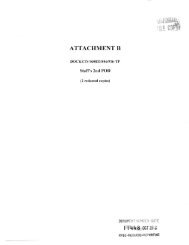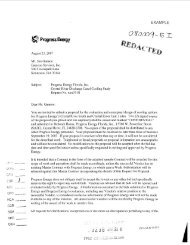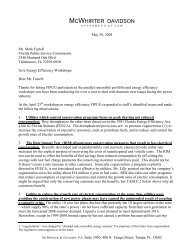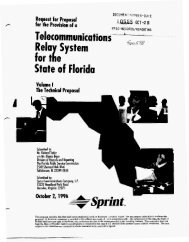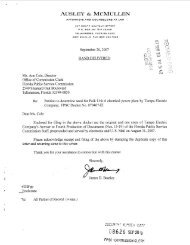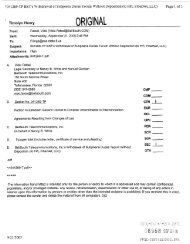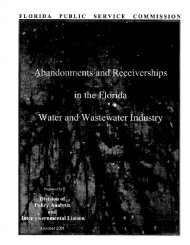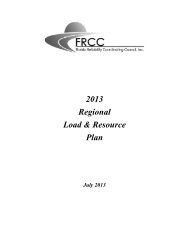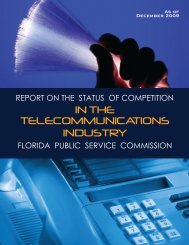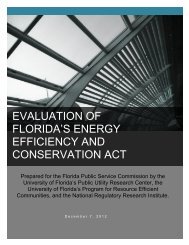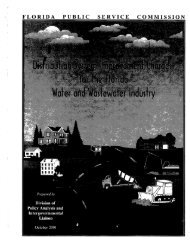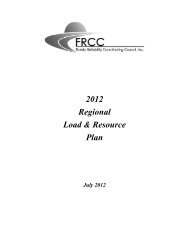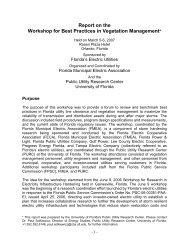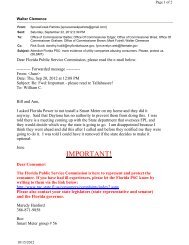Review of 2006 Ten-Year Site Plans - Public Service Commission
Review of 2006 Ten-Year Site Plans - Public Service Commission
Review of 2006 Ten-Year Site Plans - Public Service Commission
Create successful ePaper yourself
Turn your PDF publications into a flip-book with our unique Google optimized e-Paper software.
FRCC on reliability matters affecting the state. The <strong>Commission</strong> will continue to work closely with<br />
the FRCC, NERC, and FERC to ensure the adequacy and reliability <strong>of</strong> Florida’s electric grid.<br />
FRCC TRANSMISSION PLANNING PROCESS<br />
One <strong>of</strong> the benefits attributed to the formation <strong>of</strong> a regional transmission organization (RTO)<br />
is centralized, coordinated transmission planning. In April <strong>2006</strong>, the <strong>Commission</strong> closed a lengthy<br />
investigation into the prudence <strong>of</strong> forming an RTO, known as GridFlorida, because it did not appear to<br />
be cost-effective. The <strong>Commission</strong> directed Peninsular Florida’s utilities to coordinate their<br />
transmission planning activities through the FRCC in an effort to capture some benefits <strong>of</strong> an RTO.<br />
The FRCC’s transmission planning process is expected to yield a more complete transmission<br />
expansion plan from a peninsular perspective. The process will ensure that the reliability standards<br />
and criteria established by the NERC and the FRCC are met and will use the specific design,<br />
operating, and planning criteria employed by Peninsular Florida transmission owners. The<br />
<strong>Commission</strong> staff has participated in the FRCC’s meetings on transmission planning. The<br />
<strong>Commission</strong> will continue to monitor coordinated planning efforts by Florida’s utilities and, if<br />
necessary, will exercise its Grid Bill authority to ensure the adequacy and reliability <strong>of</strong> Florida’s<br />
transmission system.<br />
The FRCC performs a long range, ten-year study, as well as a study <strong>of</strong> the interface between<br />
Florida and the Southern Company (Southern). Sensitivity studies test the robustness <strong>of</strong> Peninsular<br />
Florida’s transmission system under various conditions and are performed within both studies.<br />
Examples <strong>of</strong> the sensitivities studied are as follows:<br />
• Transmission and/or generation facilities unavailable due to scheduled and/or forced outages.<br />
• Weather extremes for summer and winter periods.<br />
• Different load levels (e.g., 100-, 80-, 60-, and 40 percent) and/or seasons <strong>of</strong> the year.<br />
• Various generation dispatches that will test or stress the transmission system.<br />
• Reactive supply and demand assessment (generator reactive limits and power factor).<br />
• Specific areas <strong>of</strong> combination/cluster <strong>of</strong> generation and load serving capability among various<br />
transmission owners/providers in the FRCC that continually experience or are expected to<br />
experience significant congestion.<br />
• Other scenarios or system conditions, such as stability analysis.<br />
Consistent with the FRCC transmission planning process, these sensitivity studies will not<br />
necessarily call for the construction <strong>of</strong> transmission facilities identified in the studies, but will provide<br />
insight into how robust the planned transmission system is expected to be.<br />
<strong>Review</strong> <strong>of</strong> 2007 <strong>Ten</strong>-<strong>Year</strong> <strong>Site</strong> <strong>Plans</strong> 30



